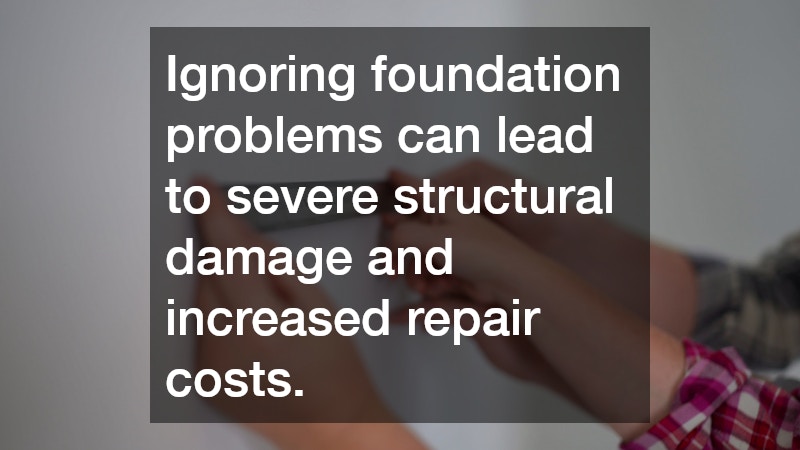Maintaining your home’s foundation is crucial to ensuring the overall integrity and safety of the structure. Ignoring potential signs of damage can lead to costly repairs and even jeopardize the safety of your home. Seeking a professional foundation repair service at the first sign of trouble helps protect your property, prevents further deterioration, and ensures long-term stability for your investment.
There are multiple indicators to watch for that may suggest your foundation is in need of professional repair. By recognizing these early signs, you can avoid more severe problems down the line.
This article explores the common signs that indicate the need for foundation repair and the underlying causes and risks associated with delaying necessary interventions.
1. How Do I Know If My Foundation Needs Repair?
1.1 Visible Cracks in Walls and Floors
Visible cracks in your home’s walls, floors, or brickwork are often the first signs of foundation trouble. While minor hairline cracks are common, larger fissures could signify structural weakness.
Cracks that widen over time or appear in different areas of your home can indicate shifts in the foundation. It’s important to have a professional inspect these issues to determine the severity.
In some cases, cracks may allow moisture to enter, which could lead to further damage or mold growth. Prompt attention to these warning signs will help protect your home.
1.2 Doors and Windows That Stick
When doors and windows begin to stick or become difficult to open and close, this could be a sign of foundation movement. Misaligned frames are often an indicator that your foundation may have shifted.
If you notice gaps at the tops or bottoms of doors and windows, or if they no longer latch properly, it might be time to call a professional. Addressing these issues early can prevent further complications.
Repeated issues with doors and windows could also affect your home’s energy efficiency by allowing air drafts. Ensuring a good seal not only resolves foundation concerns but can also improve comfort in your home.
2. What Are the Main Causes of Foundation Problems?
2.1 Poor Drainage and Water Damage
Poor drainage around your home’s foundation can lead to water accumulation, which poses a significant risk. This water can seep into the foundation, causing expanding soils and excessive moisture.
Excess moisture can lead to erosion, weakening the soil that supports the foundation. Installing proper drainage systems can mitigate these risks and help maintain a stable foundation.
Regularly inspecting and maintaining gutters and downspouts can reduce the chances of water-related foundation issues. Prevention through proper drainage management is key to avoiding costly repairs.
2.2 Soil Movement and Erosion
Soil movement, such as expansion and contraction, is a natural process that can impact your foundation over time. Certain soil types, such as clay, are particularly prone to these fluctuations.
Temperature changes and varying moisture levels can exacerbate soil movement, leading to pressure on your foundation. Understanding the soil composition around your home can help predict potential problems.
Addressing soil movement proactively can prevent serious damage to your foundation. Specialists can offer solutions, such as soil stabilization, to counteract these natural forces.
3. What Are the Risks of Ignoring Foundation Issues?
3.1 Structural Damage
Ignoring foundation issues can lead to significant structural damage over time. As the foundation settles or shifts, walls and floors may start to bow or sag, compromising their integrity.
Continued displacement of the foundation can result in more severe issues, such as cracks in load-bearing walls or unstable flooring. These problems pose serious safety risks if not addressed promptly.
Regular inspections by professionals can catch structural damage early, enabling repairs before they become unmanageable. Proactive maintenance ensures the longevity and safety of your home.
3.2 Increased Repair Costs
Delaying repairs can significantly increase the costs associated with foundation issues. As damage worsens, more extensive work may be needed, involving not just the foundation but also the rest of the house.
Addressing minor issues early on can save money by preventing more complex repairs in the future. Immediate action limits the extent of damage and the repairs needed to fix it.
Foundation repairs become more complicated and costly the longer they are postponed. Timely intervention is not only cost-effective but also crucial for preserving the value of your home.
In summary, recognizing the signs of a failing foundation—such as visible cracks, sticking doors, and windows—is crucial for early intervention. Understanding the causes, such as poor drainage and soil movement, can help prevent issues from arising.
Ignoring foundation problems can lead to severe structural damage and increased repair costs, underscoring the importance of professional repair services. Maintaining your foundation is a wise investment in the safety and durability of your home.

